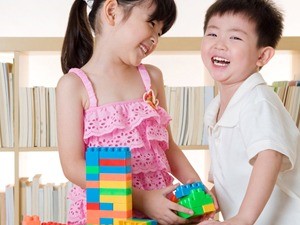- 855.224.8655
- Schedule a Tour

Learning to resolve conflicts constructively without resorting to anger or fighting is one of the most important skills any child, or for that matter any adult, can learn. At U-GRO Learning Centres, we take every opportunity to engage children in learning about social skills and interaction techniques, helping them to learn to express their opinions in conflicts without overriding or disrespecting others.
The Importance of Conflict Resolution
No child is too young to learn how to play and cooperate with others, an important skill for preschoolers to develop and grow. There are numerous other skills children learn when you inform them about how to resolve differences, as well:
- Students learn how to listen to others.
- Children become more aware of their needs.
- They learn how to communicate their thoughts and feelings in a respectful way.
- They feel inspired to think creatively to search for solutions.
6 Conflict Resolution Tips for Teachers
Preschool is the perfect time to start learning conflict resolution, since these years are when many children encounter people outside of their families for the first time. Here are six ways to help preschoolers learn conflict resolution strategies.
Help them verbalize their feelings.
None of us is born with the vocabulary to explain our feelings and opinions to others. Show children pictures of faces with different expressions and ask them to explain what they think the person depicted is feeling. This will help them learn that everyone has feelings and that they are possible to explain in a calm manner.
Practice conflict scenarios.
It’s much harder to intervene once an actual conflict has begun than to teach children the skills to manage one ahead of time. Come up with an example scenario for two children to act out in front of the class. For example, tell them to pretend they both want to play with the same toy. Then, ask them to describe their feelings and provide productive solutions to the scenario, like taking turns or flipping a coin to see who will get the toy first.
Model good behavior.
When you find yourself in conflict with a student or another teacher, be sure to handle it calmly and rationally to provide a good model of problem solving for your students. Go to a quiet area, practice listening without interrupting, and other good solving skills.
Read stories about conflict resolution.
One fun method of teaching conflict resolution for preschoolers is to read stories where characters have to solve a problem. For example, the book Hey, Little Ant is a great story for preschoolers to teach this concept. After you read the story, talk to the children about what they thought. How did the characters solve the problem? If you were in the story, how would you have handled the problem?
Continue to observe.
Remember, as a teacher, you are there to facilitate conflict resolution. Try to let children solve the problems on their own. Once you begin putting these methods into practice, it is good to keep an eye on the students to see how they do. When children get into a conflict, ask questions that can help them reach one or more solutions to try. Make it fun and ask children to put on their “thinking caps” to come up with creative ideas.
Praise students when they resolve conflict on their own.
It is critical for children to understand that when they find a solution independently, they receive praise. That way they understand to continue exhibiting the behavior. Conflict comes up in everyone’s lives, and the most important lesson to teach with these behaviors is that conflict is normal. Students should eventually understand that they are not the only ones who do not always get their way. It happens to everyone, and that context allows for immense emotional growth.
When children develop skills necessary to share and play cooperatively, they’ll become better at implementing these skills on their own. Additionally, they’ll better be able to apply these skills outside of the classroom. With a commitment from parents to continue these lessons at home, children can improve their social skills.
At U-GRO Learning Centres, problem solving is an integral part of our PathFinder program and curriculum.
Learn more about what sets our curriculum apart, and apply to join the U-GRO team!
